“It is my sincerest wish to all those in this courtroom and all those outside
that this day brings a terrible chapter to an end.” - GM
June 28th
I arrive at the Thurgood Courthouse just before 6 a.m. to relieve the guy I've hired to sit overnight and secure a place for me at the front of the line—the only way to make it under such unpredictable circumstances and guarantee that my flight out to document a single day in court, does not end in vain.
When the sun rises, the city looks slightly adjusted by a crisp lens, edged with new light crawling over the skyline. Leslie arrives, then Lucia, then a handful of other Maxwell trial graduates who greet each other with a burst of enthusiasm amidst this long-anticipated sentencing reunion. The predicted tension (an ongoing focal point between online spectators suspecting that our conflicting coverage of the Depp vs. Heard trial would mean the end of a friendship between Lucia and me) is nonexistent. Thankfully we are both genuinely happy to see one another, and I'm relieved to see her looking healthy and refreshed after an extended hospital stay due to ongoing struggles with autoimmune issues.
Leslie is electric and lovely as always, with more energy than any of us at 6 a.m. Her infectious smile and keen wit are on full display as she distributes coffee and tells us about the red Prada blouse she has tucked inside her bag, which she intends to change into once we get inside. A plan that sadly never transpires, seeing how court days are so damn unpredictable.
As the morning wears on, the line starts snaking down along the street. On the curb opposite us, news outlets are setting up, sectioning off small square grids to secure ideal filming angles for press conferences they know will unfold after court. The lone camera guy I summoned (as part of a last-minute effort to capture the day from an independent perspective) trails behind me, asking that I turn my mic back on.
In front of the court, a protester carries a sign that warns, "The Maxwell's are Israeli intel." He is amped-up and angry, spewing anti-Semitic verbiage and shouting phrases about how "All Jews are just like Epstein." The insults spark a heated exchange between him and another man who finally approaches him, insisting he stops. Within seconds, they are both yelling at one other in front of a grip of concerned onlookers and media crew.
Meanwhile, Lara Haim, the French crime journalist I adore, is making the rounds with kisses and hellos, a pretty blue scarf effortlessly tied around her neck. She hints at a rumored "bombshell" on which the New York Times is sitting, in relation to this case. Details she has failed to uncover, but nonetheless, invite an array of theories and predictions from everyone eavesdropping in line.
When I return to my spot, I notice a shocking new addition standing next to Leslie. The face I recognize immediately, despite a feeble attempt at disguise. A baseball cap, aviator sunglasses, and camouflage sweatshirt hardly mask the fact that Scotty David ("chatty juror 50") is standing in front of me, happily chatting with Lucia. I introduce myself and am cordial with introductions and small talk, but feel conflicted immediately. Wondering why he would show up after the spectacle he caused post-verdict. In several interviews and documentaries, he insinuated his influence over stumped jurors as the difference between a guilty verdict and a potentially hung jury, in addition to the attention he sought after denying personal investment in this case and lying on the questionnaire about his history of sexual abuse.
“Scotty Fucking David is here, did you see that?” one of the other reporters says to me. "It's highly unethical if you ask me," the woman next to him chimes in.
When Jess and Hayes arrive to bring me a coat I left behind, I watch Hayes step out of the cab and look straight up at the face of the courthouse, mesmerized by the chaos unfolding around us. The manic protestor is still spouting insults. Hayes watches intently for a minute before snapping a photo and hugging me goodbye, returning to LEGO shopping and Shirley Temple indulgences that will define his first NY experience thanks to Jess and her sweetly crafted itineraries. Cab rides and subways take them from parades to museums to candy shops and epic toy stores around the city while I work. In a new red Met hat and punch-stained smile, the boy is certainly not resentful.
In the courtroom, the benches fill up quickly, packed in a way I've never seen before. Thanks to a stroke of dumb luck I am seated next to Scotty David, who holds a book titled, The Witches We Didn’t Burn. It screams calculated symbolism. Absurd in its obviousness, but also completely on brand.
I dread the moment Isabel Maxwell will turn around and spot him beside me.
When I look across the room, I catch the eye of a court marshal who is glaring at me with one brow raised. He assumes Scotty David came with me. A notion that has me silently cursing my fate as I pull a pair of sunglasses out of my bag and put them over my eyes. When I do, Scotty turns to me and says, "Now I remember you. I remember looking at you thinking, ‘why is this bitch always in sunglasses?’"
I laugh out loud at the boldness. So brash, it almost makes me like him.
Once everyone is seated, a man with a loud creaking ladder works his way down the length of the courtroom, closing each of the heavy curtains with a long metal hook. Someone on the bench makes a Game of Thrones “Red Wedding” reference as we watch sunlight drain from the room. I look over the people filtering in, searching for any sign of Ghislaine’s friends. I spot no one. Not even Harriet Jagger, her boarding school pal, a fashion and style director at Elle, Vogue, and Tatler, who had vowed to show up today and speak affectionately on her behalf.
In front of me, two victims—Sarah Ransome and Liz Stein—are seated side by side, shoulder to shoulder, dressed in bright blue and hot pink. Colors that cut through a sea of black and gray. In front of them, Annie Farmer sits next to a slick-haired Brad Edwards and Sigrid McCawley, in her signature white suit (ode to the suffragettes) and perfectly coiffed platinum layers.
Sketches via Jane Rosenberg, for Reuters
At the front, the Maxwell family is situated. Kevin, Christine, and Isabel (nearly unrecognizable without her signature beret) are all lined and noticeably reserved. When Bobbi Sternheim enters, Isabel rises to hand over a plastic bag. A large Fuji water bottle is pulled out and placed on the desk where Ghislaine will sit. One of the running jokes throughout the trial revolves around the Fuji water bottle, deemed the unofficial sponsor of this court saga, and seemingly Maxwell's preferred brand. What we imagine is a lavish treat these days, considering whatever awful variation she’s accustomed to at MDC prison.
When the door in the back opens, the chatter in the room falls instantly away. Ghislaine appears in the doorway, dressed in blue prison scrubs over a white long-sleeved undershirt; the gray streaks visible throughout her hair during the March hearing have all been covered. Her hair is smooth, full, and black. Her frame is thin and her demeanor, hapless. She is not engaging, blowing kisses to her sisters or hugging lawyers on the way to her seat. Instead, she makes her way directly to her desk, the eerie clink of her shackled gait impossible to ignore as she moves across the room in a scene (and sound) that is unexpectedly uncomfortable for all of us watching.
Once she is seated, she turns around to take a long sharp scan of the gallery behind her, her eyes dart across a cluttered mix of family members, reporters, journalists, law students, attorneys, FBI agents, court marshals, and the handful of victims who are there to address her directly, in impact sentiments they have printed on their laps.
She pours the water from the bottle into a styrofoam cup and takes a long sip before settling into her seat. Her hands are delicate and appear much younger than her age. Her gaze settles steadily on the front of the courtroom.
The first half of the day is devoted to complex deliberations about the counts and their restrictions. They run through endless numbers and legal jargon before both sides offer a summarized recap of their arguments, followed by their preferred sentence terms. The prosecution is requesting that she receive at least thirty years. The defense wants five.
During the break, we rush to grab a snack and use the bathroom. Leslie and I split a stale chicken sandwich from Cafe Lorenzo, where every purchase is a paid regret. On my way back, I spot Christopher Mason sitting on a bench alone. I recognize him as the eloquent and flamboyant personality in several of the Maxwell documentaries. An old friend of Ghislaine’s who writes about the worlds of art, society, and fashion for various outlets. Dressed in a blue gingham button-down, orange sneakers, and circle-rimmed glasses, he is a stand-out based on wardrobe alone.
I introduce myself and tell him how much I enjoy his animated contribution to each of these series. With only a few minutes to spare, I ask what draws him to the trial: "Human nature." And how long he's been covering it: "Since the start." He reveals some recent run-ins with Maxwell’s old Oxford pals, people from her past whom he says are "absolutely gutted" by this.
When I ask him what they think of her now, he tells me, "They attribute much of this to her father. They don't see her as a monster."
I push the topic and inquire why none of them have shown up as support. "The support is there, but silently so." He tells me, explaining that it's too risky to rally behind her publicly. As he is explaining this, it occurs to me based on his acute attention to detail that it's worth a shot, to try and solve one of the petty mysteries I know is likely to haunt me forever. A frivolous footnote I can’t let go of.
"You don't happen to know anything about the gold boot earrings she always wore, do you?" I ask. He looks at me, confused, so I explain that the gold boot earrings are her most repeated accessory, but quite a peculiar choice for a posh British woman with extravagant taste in designer jewelry. I want to know if there is any meaning behind them.
"The only thing I can think is they have something to do with the ranch in New Mexico..." he says. "No, they appeared long before that," I reply.
"Ahh," he says. "I wish I knew."
After the break, the victims are called to read their statements aloud. One after another, the women take the podium. Kate, Annie, Liz, and Sarah all address Ghislaine, who rejects any connected eye contact. Their statements come with tears and trembling hands, recounting how the abuse affected them in devastating ways into adulthood. Unveiling personal tales of depression, issues with trust, addiction, and general brokenness in them that stem from the betrayal they suffered under her grooming. Each of them talks about how they were betrayed by a woman they trusted, who tricked them into believing she genuinely cared for them.
Annie Farmer: “For a long time I wanted to erase from my mind the crimes that Jeffrey Epstein and Ghislaine Maxwell committed against me … but I’ve had to acknowledge the long-lasting effects. One of the most painful and ongoing impacts of Maxwell and Epstein’s abuse was the loss of trust in myself.”
Kate: “At a time when women’s rights have so callously been discarded, as a mother of a young daughter, I fear for the safety and freedom of my child,” adding that if “we cannot stop women who’ve been raped from being forced to bear children from their rapists, then we must take a stand of zero tolerance for those who abuse their power” to sexually abuse and traffic. She ended, insisting that Maxwell “ruined the lives of countless women and children” but was unrepentant. “She doesn’t think what she did was wrong. She is not sorry. She would do it again.”
Elizabeth Stein: a student at the Fashion Institute of Technology, describes being lured into Maxwell and Epstein’s orbit as a college senior while working at a clothing shop where Maxwell was a customer.
“I called her office for delivery instructions and was told to bring them to a hotel close by to the store,” Stein said. “When I arrived, the hotel concierge told me Ms. Maxwell was in the bar and that she wanted to meet someone.” It was Jeffrey Epstein. “That night in the hotel was the first of many times they sexually assaulted me.”
“I was trapped. I was assaulted, raped, and trafficked countless times in New York and Florida,” over several years, Stein said.
Sarah Ransome: between tears, detailed her abuse by Epstein 17 years ago at 22, after she came to New York City to study fashion, like Stein. Referring to herself as a “sex toy with a heartbeat,” used “For the entertainment for Epstein, Maxwell, and others, I was subjected to sexual predation multiple times a day – both in his New York mansion and on his private island in the US Virgin Islands.”
“On one of the visits to his island, the sexual demands, degradation, and humiliation became so horrific that I attempted to escape by jumping off a cliff into shark-infested waters,” said Ransome.
After all of the statements are read I note one major detail consistently overlooked by media in their recaps. Reference to being trafficked to “others,” lent out to “all of their friends” - incriminating individuals, with involvement mentioned, but continually unnamed.
When the judge asks if the defendant would like to respond, there is a brief scuffle between Maxwell's lawyers.
"Yes, your honor," Sternheim replies. The response stuns the court. We all sit in shock watching Ghislaine prepare herself for the podium. There is an eagerness in her demeanor as she approaches. Until that moment, no one in that room has ever heard her speak, and certainly, none of us was expecting it today.
When she speaks, her voice is like silk, commanding but in a strangely comforting sense. Each word is carefully framed by a poised accent. Another alluring trait exposed as obvious evidence of her appeal. When she speaks, you want to believe her. Even knowing she is unrolling a carefully crafted statement designed for the court, that does not directly incriminate herself, apologize for her involvement, or validate the claims of the women who are sitting behind her.
It is a statement guarded by plans for appeal. But the weight of it is punctuated by the purposeful pause she takes, to highlight each of the years Epstein was caught but escaped legal persecution.
“Your Honor, it is hard for me to address the court after listening to the pain and anguish expressed in the statements made today.
The terrible impact on the lives of so many women is difficult to hear and even more difficult to absorb, both in its scale and extent.
I acknowledge their suffering and empathize deeply with all the victims in this case.
I also acknowledge that I have been convicted of helping Jeffrey Epstein commit these crimes.
And despite the many helpful and positive things I have done in my life- and will continue to do to assist others during my sentence-
I know that my association with Epstein and this case will forever and permanently stain me.It is the greatest regret of my life that I ever met Jeffrey Epstein.
I have had plenty of time to think, having spent two years in solitary confinement.
I believe that Jeffrey Epstein was a manipulative, cunning, and controlling man who lived a profoundly compartmentalized life
and fooled all those in his orbit.Variously, his victims considered him a godfather, mentor, benefactor, friend, and lover.
It is unfathomable today to think that that is how he was viewed contemporaneously.His impact on all those who were close to him has been devastating. And today, those who even knew him briefly
or never met him but were associated with someone who did
have lost relationships, and jobs, and had their lives derailed.Jeffrey Epstein should have been here before all of you.
He should have stood before you years ago in 2005
in 2009
and again in 2019
all the many times he was accused, charged, prosecutedHe should have spared victims the years of chasing justice.
But today is ultimately not about Epstein.
It is for me to be sentenced
and for the victims to address me alone in court.To you I say: I am sorry for the pain you experienced.
I hope my conviction along with my harsh incarceration brings you closure.
I hope this brings the women who have suffered some measure of peace and finality
to help you put the experiences of those so many years ago
in a place that allows you to look forward and not back.I also acknowledge the pain this case has wrought on those I love, the many I held and still hold close, and the relationships I have lost and will never be able to regain.
It is my sincerest wish to all those in this courtroom and all those outside
that this day brings a terrible chapter to an end.And to those of you who spoke here today and those who did not, may this day help you travel from darkness into light.”
Her sentence term is announced at the end of the statements by Judge Nathan in a long explanatory speech stressing that her punishment is for her actions, and her complicity, not Epstein’s crimes. The 20-year sentence is broken down by months, attached to a 750K fine.
When we go to exit the courtroom I head for the first elevator down but see it is packed with the Maxwell siblings, looking somber, standing beside Lara (who somehow always manages to squeeze herself into this arrangement after court, in hopes that her French fluency will pry something unique out of one of them)
I skip the cramped elevator and walk into the one beside it instead, where one of my favorite court marshalls, a steady presence throughout the trial, is standing holding the door for me.
Once in, I ask him what he thinks about the end of this. The question causes him to inhale, and take a long breath before deciding how he wants to respond.
“I just think … all of that … to protect a bunch of rich white men,” he says, shaking his head as the doors slide open to empty us out into the lobby.
Kevin Maxwell responds
Outside a frenzy erupts with big media outlets smacking elbows with independent reporters all armed with iPhones, trying to capture statements from both parties. First, Brad Edwards, recounting all of the years that have gone into seeing Maxwell to her sentencing day, then Annie Farmer and Sigrid McCawley with a victorious message for survivors watching, followed by Kevin Maxwell surrounded by the twins, vowing unwavering support for Ghislaine, and insisting that an impending appeal will eventually vindicate her.
After the crowd dissolves I call a friend whose research and dedication to this case spans decades, to ask about the repeated reference to “all of the friends” in these impact statements. I want to know why none of these victims have exposed any of the cliental.
“Is it because they were maybe too young to know who these high-profile men even were?”
“No,” she says, “It’s because they’ve all been paid millions to keep their mouths shut.”
When I run through a full recap of the day for her, I explain how Ghislaine’s lawyer’s requested she be transferred to Danbury prison, to take advantage of the self-help programs they offer, designed to aid inmates in their health and healing.
“Doesn’t really matter where she ends up,” she says, with frank confidence. “No one thinks she’s going to make it past a year anyway.”
On independent reporting: featuring Leslie Kritzer, Jarva Lund, Jaggyish






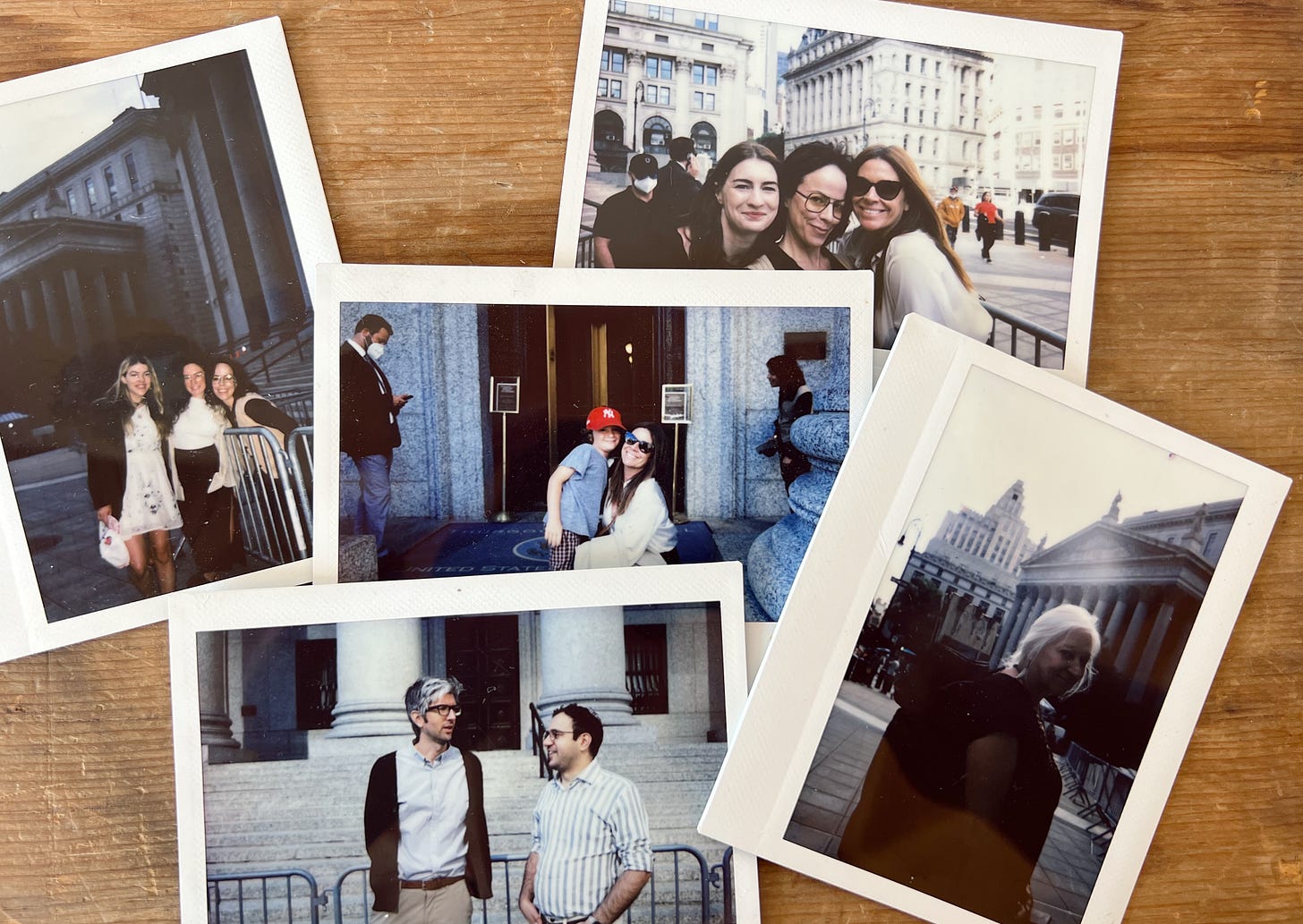
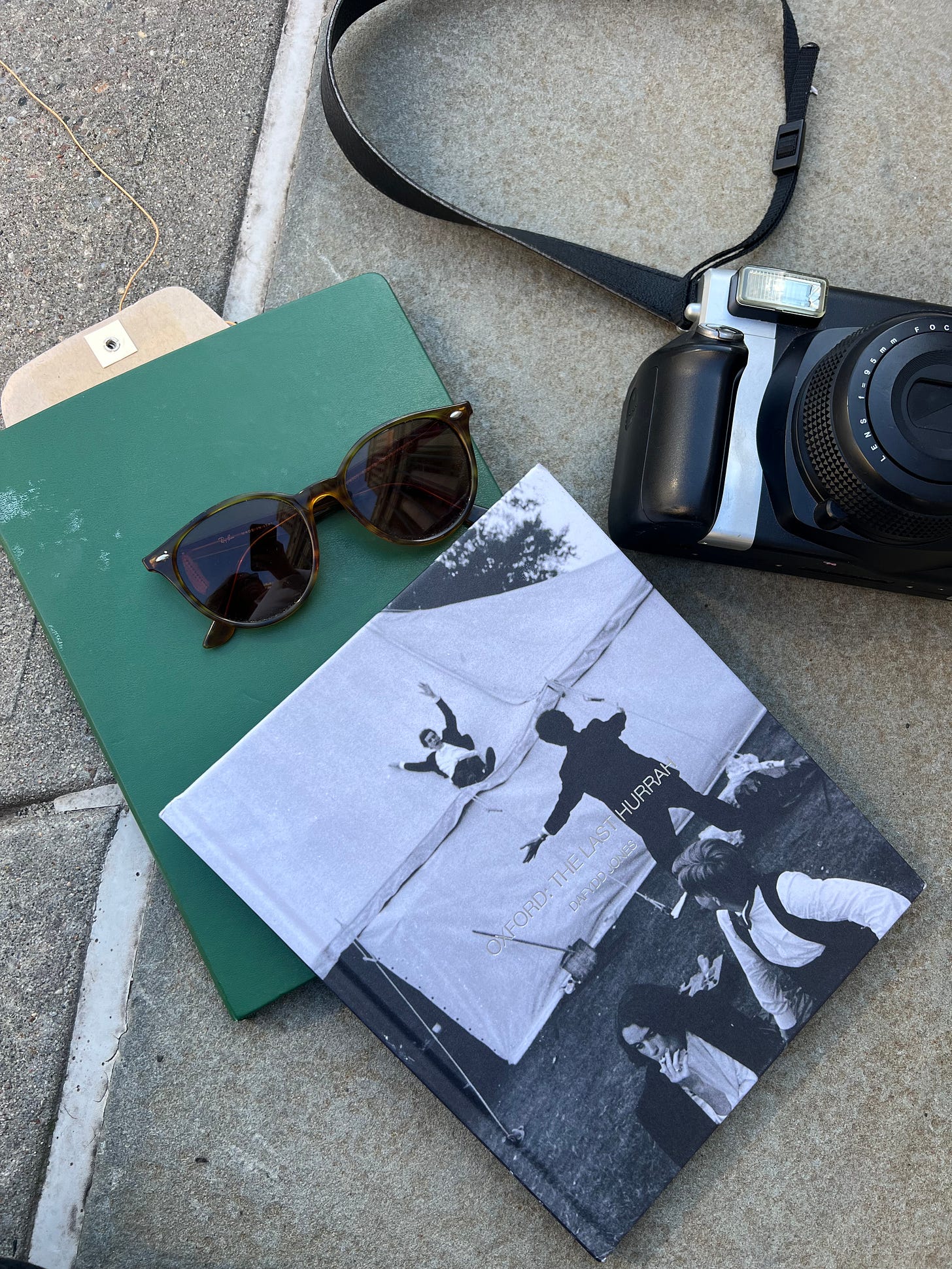
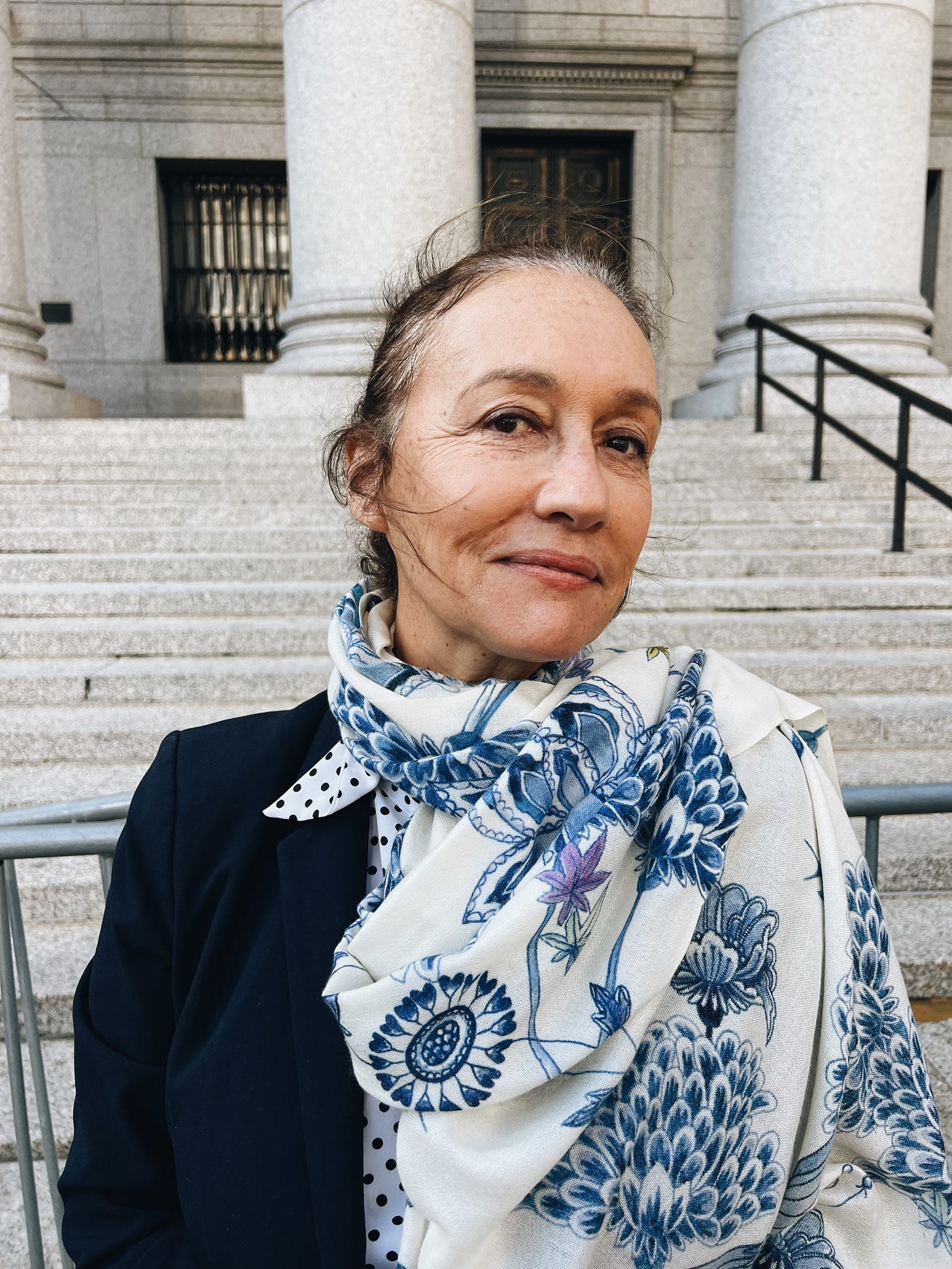
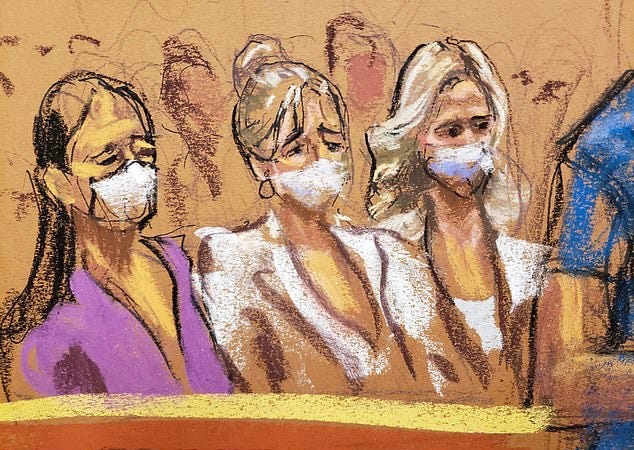
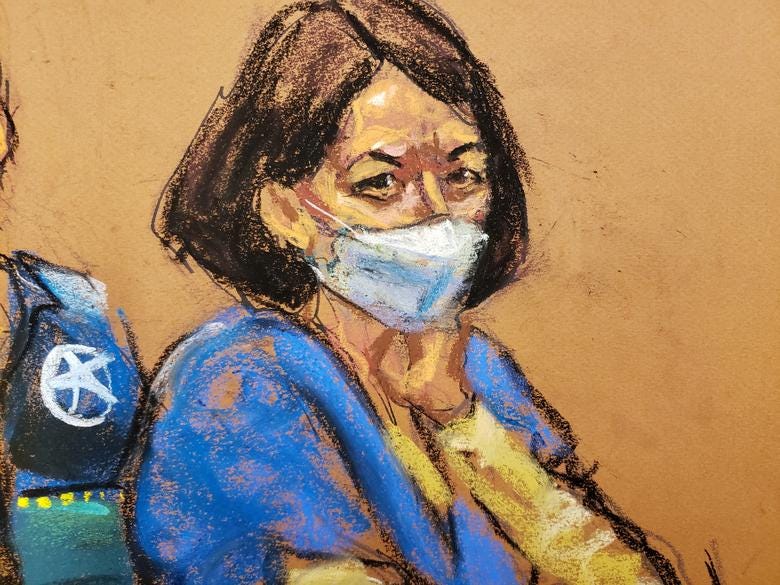
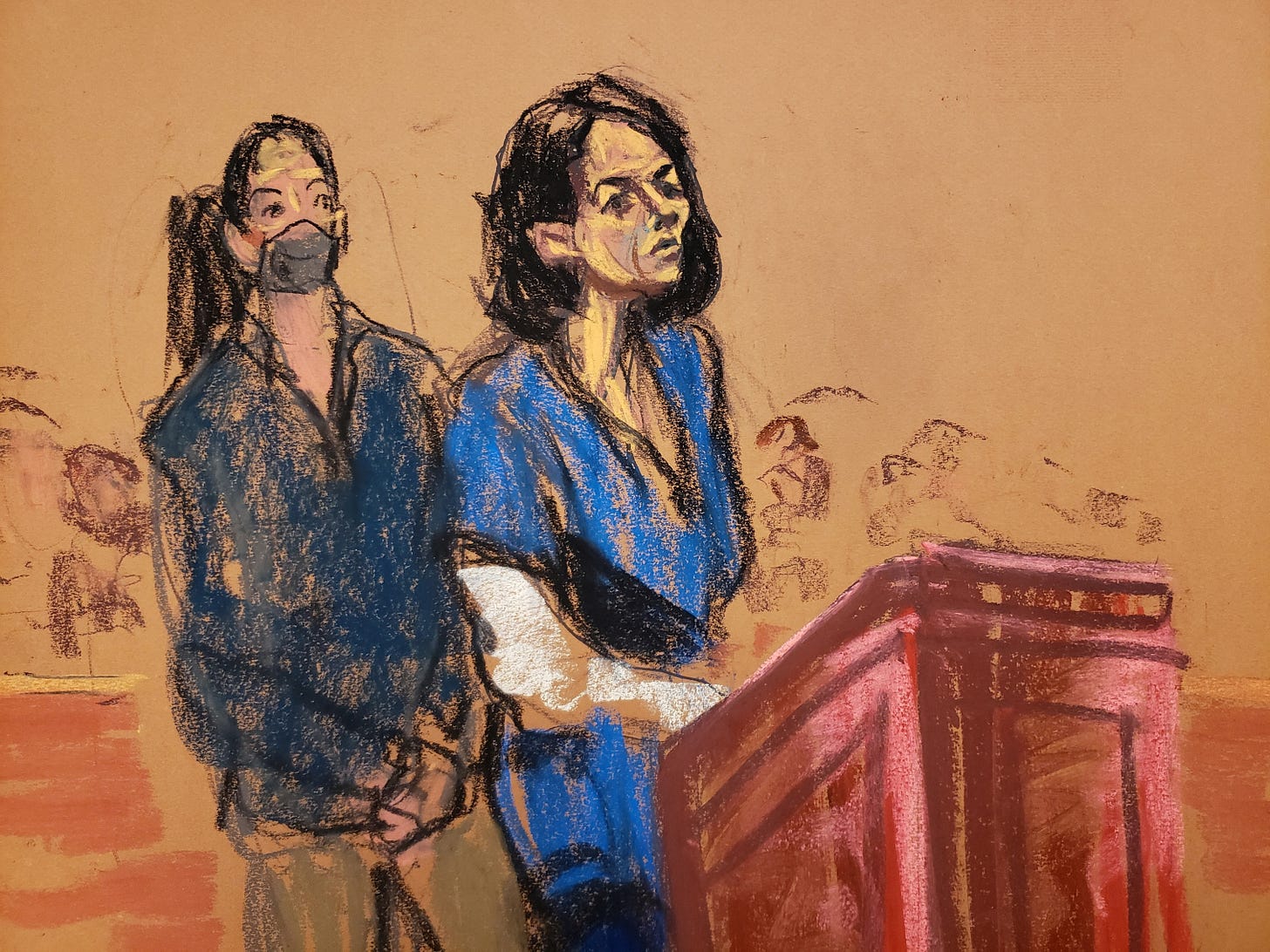
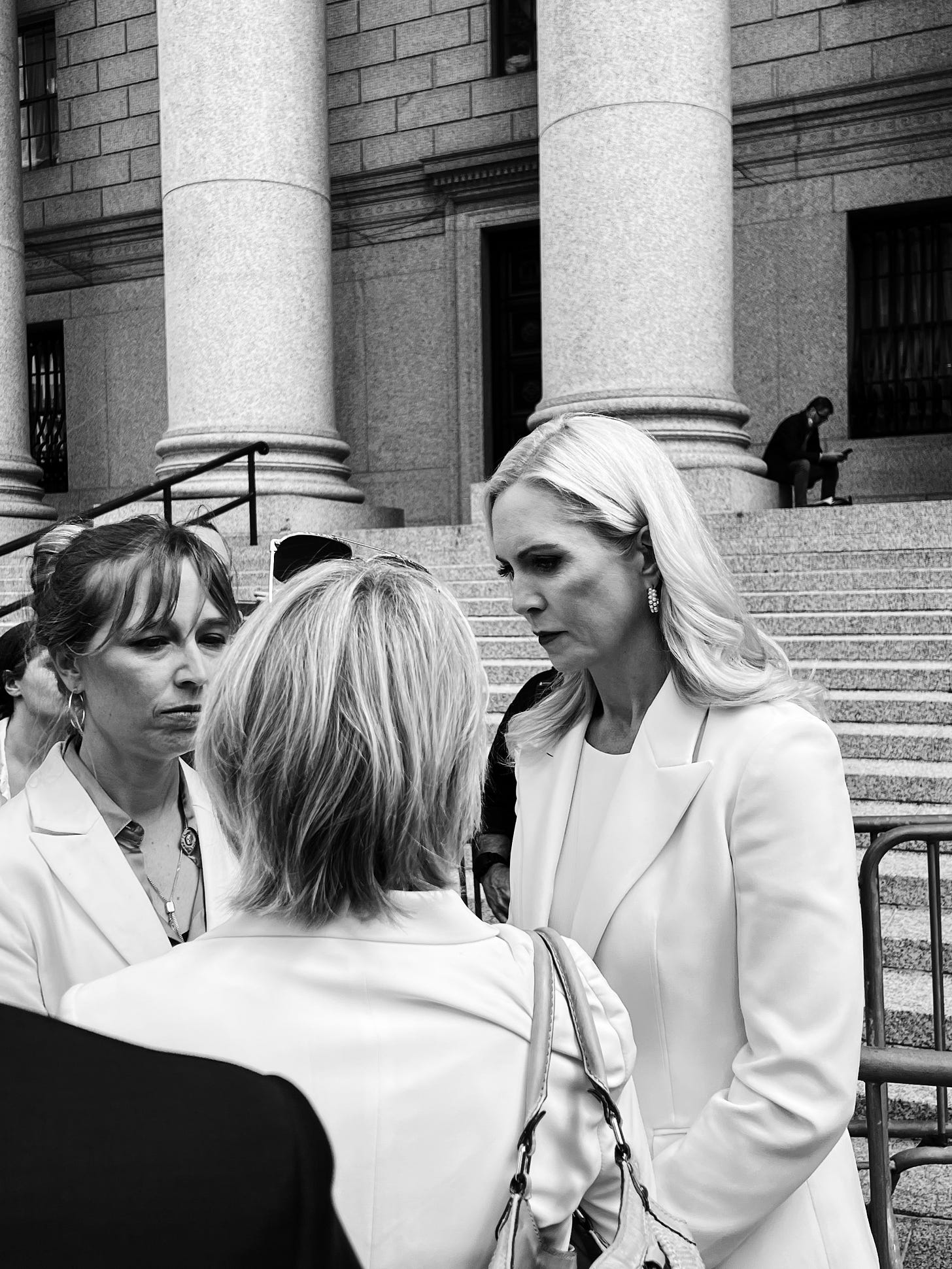
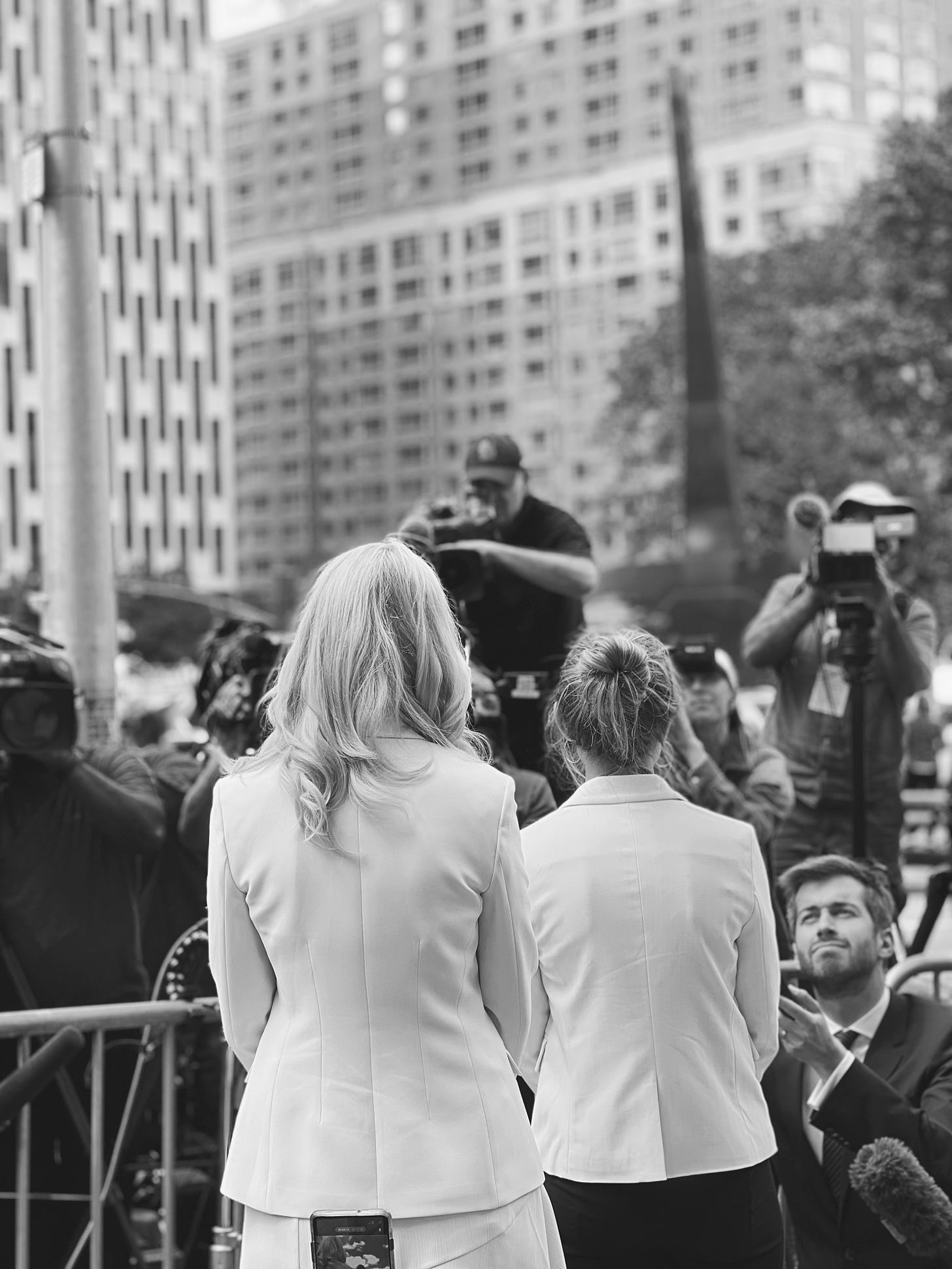
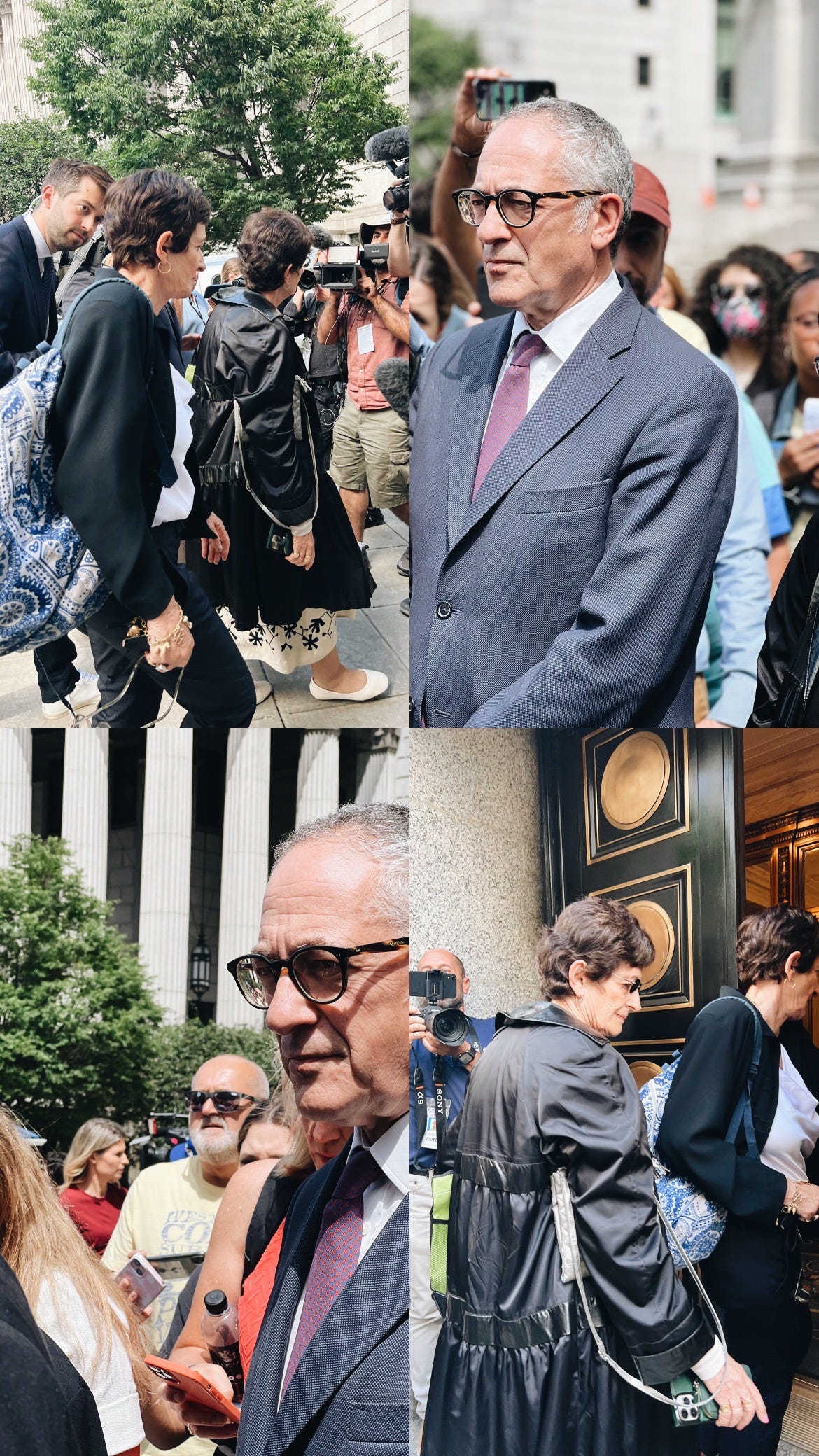
Jessica you never fail to take us along in your journey’s. I always look forward to the twists you gift us with.
The friends can be guessed at by flight logs & the circle of friends at the time- Trump, Clinton , Dershowitz , Gates & other scions of industry + political big wigs -whose names aren't as well known. White men with power - and perversions.
The reality that Ghaislane , a woman , is taking the fall , does bother me - I have a sympathetic view of her - regardless of if appropriate or not , I do.
The friends who were sexually involved with the girls will get away with it , and that upsets me beyond belief , while she will be behind bars.